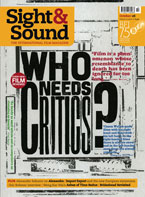
October 2008
Please view our back issues page for more information about obtaining previous months issues, dating back to 1995.
Features
 Who needs critics?
Who needs critics?
Critics need to show more passion and conviction if they're still to matter in the internet age, argues Nick James PLUS our panel of leading critics select examples of the great writing that inspires them; Mark Fisher on the vital role of the blogger; Mark Cousins on the necessity of critical advocacy; and Amy Taubin celebrates the life of the great critic and artist Manny Farber
 Critics On Critics
Critics On Critics
Sight & Sound asked leading critics to choose the works of criticism which have had the greatest impact on them, inspiring them to become critics themselves, and which make a case for criticism as a minor art form in itself.
Late liberty
Eric Rohmer's The Romance of Astrea and Celadon may be the last film in a remarkable career that stretches back to the origins of the French New Wave. He's been very lucky, he tells Geoff Andrew
Brideshead reloaded
Evelyn Waugh and his peers at Oxford in the 1920s were among the first British intellectuals to take cinema seriously as an artform, writes Henry K. Miller PLUS Philip Kemp talks to director Julian Jarrold about his new film adaptation of Waugh's great novel Brideshead Revisited
Grandmother's russia
Alexander Sokurov's latest film Alexandra tells of a grandmother's journey into war-torn Chechnya, but is it politically sensitive, Ian Christie asks its director?
Diamonds are forever
As the British Film Institute celebrates its 75th birthday, Geoffrey Nowell-Smith looks back at its history, and what it reveals about the challenges of public arts funding in Britain PLUS Charles Whitehouse selects ten classic films from the now defunct BFI Production Board
Europa europa
Ulrich Seidl has been accused of exploiting the amateur actors in Import Export, his brilliant and unsettling vision of a troubled contemporary Europe. Not true, he tells Catherine Wheatley
Selected reviews
 Ashes of Time Redux
Ashes of Time Redux
The definitive new version of Wong Kar-Wai's complex and visually stunning martial-arts epic in which east meets Western sees the film at last fulfilling its sizeable creative and commercial potential, says Mark Sinker
 DVD Review: The Garden of Earthly Delights
DVD Review: The Garden of Earthly Delights
Polish director Lech Majewski uses modest means and big ideas to create a camcorder masterpiece, writes Tim Lucas
Reviews in this issue:
- Alexandra
- Ashes of Time Redux
- Babylon A.D.
- Black White + Gray
- Brideshead Revisited
- The Chaser
- The Cool School
- The Dark Knight
- Face Addict
- Faintheart
- The Fall
- The Foot Fist Way
- Free Jimmy
- Garden of Earthly Delights
- DVD Review: The Garden of Earthly Delights
- The Girl who Leapt through Time
- Good Dick
- Heavy Load
- Heavy Metal in Baghdad
- Import Export
- I've Loved You So Long
- Jar City
- Linha de passe
- Little Box of Sweets
- Live!
- Love Story 2050
- Make It Happen
- The Mummy Tomb of the Dragon Emperor
- Partition
- The Putin System
- The Romance of Astrea and Celadon
- Sarah Silverman: Jesus Is Magic
- Star Wars The Clone Wars
- Steep
- Step Brothers
- Swing Vote
- Then She Found Me
- Triangle
- Unrelated
- A Walk into the Sea
- The X Files I Want to Believe

 Jar City
Jar City Linha de passe
Linha de passe